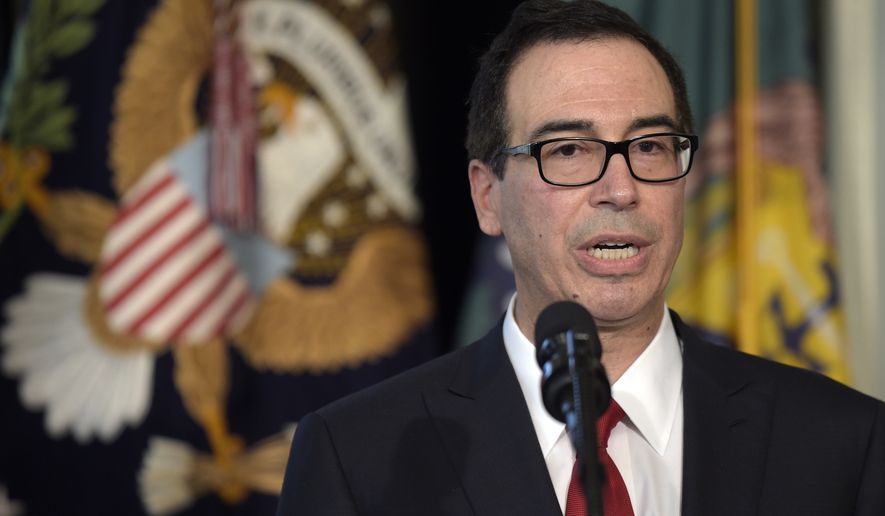The last time Congress passed a major tax overhaul in the 1980s, all sides agreed that the goal was to streamline the code, leaving the government’s overall income static. Now, as Congress prepares to try again, that consensus has disappeared.
Democrats say a major goal of reform should be to soak the rich, trying to reverse what they see as growing income inequality. Republicans, meanwhile, say reform should be revenue-neutral or, in the best of cases, produce a net tax cut for Americans.
Left without Democratic partners, Republican leaders are plowing ahead on their own, realizing that they need to win almost total unanimity among their members to have a hope of passing something.
President Trump says there will be some sort of announcement about tax reform on Wednesday, and Treasury Secretary Steven T. Mnuchin recently said he is hopeful that something on the subject will happen this year.
“The plan will pay for itself with growth,” Mr. Mnuchin said at a summit hosted by the Institute of International Finance. “This will be the most significant change to the tax code since Reagan.”
The Republicans are pushing for an overhaul at a time when the government’s finances are strained and are likely to get much worse very quickly.
The latest projections from the Congressional Budget Office show that under current law, federal deficits would increase from about 3 percent of gross domestic product this year to about 10 percent in 2047, with spending increases driven largely by automated funding for entitlement programs such as Social Security and Medicare.
Absent major changes, the overall federal debt held by the public, measured as a percentage of GDP, would grow to an “unprecedented” 150 percent by 2047 — well ahead of the peak of 106 percent the country saw right after World War II, the CBO said.
That soaring debt is one reason why Democrats want to squeeze more money out of any tax reform plan.
“Obviously, when Clinton raised taxes, it raised a lot of money. When Bush lowered taxes, it lost a lot of money. When Obama raised some taxes, it raised a lot just back and forth,” said Chuck Marr, director of federal tax policy at the Center on Budget and Policy Priorities.
But Senate Majority Leader Mitch McConnell, Kentucky Republican, has ruled out using the tax code to increase the government’s take.
“Today’s Democratic Party, seems to me, believes that tax reform is about income redistribution, how much can we get out of successful people in order to push down to those who have been less successful. That’s not about growing the economy,” he told reporters this month, previewing the looming debate.
“I would love to be able to do tax reform on a bipartisan basis, but I think most of the Democrats today believe tax reform is a tax hike,” he said.
Mr. Mnuchin said recently that he hopes the final tax product is bipartisan but that Republicans can always use a budget tool that would allow them to pass something with a simple majority in the Senate, making a narrow path easier.
House Ways and Means Committee Chairman Kevin Brady of Texas, who is spearheading the Republican efforts in the House, met specifically with Democratic committee members before the Easter recess about the path forward.
But Jeffrey Birnbaum, who chronicled the push for tax reform in the 1980s in the book “Showdown at Gucci Gulch,” said lawmakers today can’t count on the same level of bipartisanship.
“The problem is that the Democrats appear unified in opposition to lowering the top individual tax rate and the Republicans can’t imagine a tax reform bill that doesn’t lower the top individual tax rate,” said Mr. Birnbaum, president of BGR Public Relations.
Still, the demands of a growing deficit will put pressure on Congress to find money somewhere.
“It’s all in the entitlement programs,” said Douglas Holtz-Eakin, who served as director of the CBO under President George W. Bush. “The boomers are aging into them, and the health care costs go up even faster than that.
“There are no other numbers in the federal budget that matter as much as those,” he said.
Maya MacGuineas, president of the Committee for a Responsible Federal Budget, agreed that the spending side of the equation is the most important lever for solving deficits.
But she said it’s important for Republicans not dig the hole any deeper by trying to use tax reform to eke out tax cuts.
“I think their commitment that tax reform be revenue-neutral is incredibly important,” she said. “And if that transforms into big tax cuts that lose hundreds of billions or even trillions of dollars, that is going to explode the debt even more and make getting it under control close to impossible in any shorter amount of time.”
Other issues Congress will have to tackle are Obama-era programs sold as short-term economic stimulus.
“But as most of us who follow these issues argued at the time, much of it would become permanent. And that’s in fact what happened,” said J.D. Foster, chief economist at the U.S. Chamber of Commerce.
Mr. Marr said that broadly speaking, the long-term federal budget picture is going to have to address the major issues of an aging baby boomer population, but also the fact that wages for working-class Americans have been under pressure for decades.
One provision expanded by the 2009 stimulus package was the Earned Income Tax Credit, which is a benefit that applies mainly to lower-wage workers.
Mr. Marr said targeted items like the tax credit — rather than tax cuts at the top — could help working-class Americans. “Giving a tax cut to a bunch of hedge fund folks is not going to help those people,” he said.
• David Sherfinski can be reached at dsherfinski@washingtontimes.com.




Please read our comment policy before commenting.